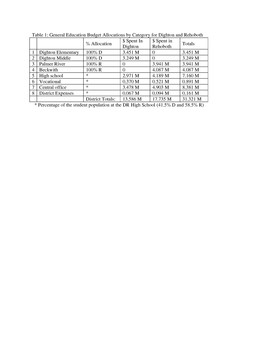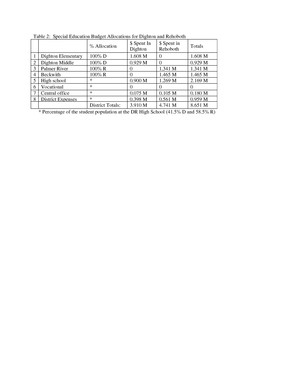School Committee Response Regarding Alternate Assessments
As Chair of the Dighton-Rehoboth Regional School Committee, speaking on behalf of myself, I would like to respond to some comments and misconceptions that were printed in the September issue of The Rehoboth Reporter. There seems to be a general misunderstanding about how assessments are performed, not only in our regional district, but as well as in regional districts across the state. I would also like to applaud the efforts of Michael McBride and of Selectwoman Pimental – the school committee always welcomes input and strives to solve problems creatively and collaboratively. However, some of the statements written were not completely accurate, so I will attempt to respond to some of the misconceptions.
Both articles suggest that alternative assessments which would benefit the town of Rehoboth are routinely used in our State. Mr. McBride states that “many regional districts currently use an Alternative Method” wherein “each town most importantly pays for only what it uses – its students”. Ms. Pimental states, “every regional school district follows an alternative method.” Currently in Massachusetts, of the 84 regional school districts that exist, 19 reported that they used an alternative assessment in the previous year according to the State Department of Elementary and Secondary Education (DESE). Furthermore, according to the Assistant Director of the Massachusetts Association of Regional Schools (MARS), many schools who use an alternative assessment are actually using an optional approach to the Statutory Assessment, and are reporting it as “alternative”. More importantly, it does not necessarily effect the way that Chapter 70 (Ch70) state monies are divided among towns in the large majority of cases. Historically, when alternative assessments are used, they are typically done as a temporary agreement during a transition period in the formation of a new regional district. They are not set up to be the yearly modus operandi of a regional school district.
Both Mr. McBride and Ms. Pimental talked about the wealth formula that the state employs in order to determine state aid to towns and school districts. Ms. Pimental says, that “Rehoboth is considered a “wealthy” town for the purposes of calculating Ch70 money”. That is correct, the state uses a wealth formula to provide state aid to towns and school districts. This calculation is based upon a towns property value and personal income. In the case of Rehoboth, the Equalized Property Value is $1.76 Billion dollars. The Equalized Property Value of Dighton is $893 Million dollars, or about half of Rehoboth. Accordingly, Rehoboth would receive about half as much state aid as compared to Dighton if apportioned by this one measure. Whether or not you personally consider Rehoboth to be “wealthy,” the town has a higher property value than Dighton by a significant measure.
Hypothetically, if Rehoboth de-regionalized tomorrow, was free from Dighton, and Rehoboth schools were organized as a single municipal district, the following would immediately occur:
1. The “unfair” wealth formula would still be in effect. The taxpayers of this town would still receive the same state aid, or less, provided currently. Additionally, they would still be responsible for paying the same minimum required contribution for our students.
2. The Dighton-Rehoboth School District would lose nearly a million dollars of regional transportation aid if Rehoboth and Dighton were separated.
3. A duplicate central office would also be required, and possibly a High School. Given the challenges that have been faced with the town hall and municipal complex, this may not be easy to accomplish.
Needless to say, it costs more to be de-regionalized than to have a regional school district. The list above is only partial. Should we attempt to decrease school spending to the state minimum, the cuts would be dramatic to the General Education budget. The Special Education budget would remain unaltered.
One way to examine if the argument, that “Rehoboth is unfairly subsidizing students from Dighton,” has any validity is to look at where the money from the budget is actually being spent by each budget category. (Table 1)
Rehoboth pays for the actual costs of its K-8 students, its respective percentage of high school students, vocational students, and Central Office/District expenses. Additionally, the Special Education costs are listed. (Table 2)
Rehoboth and Dighton each pay their actual costs for K-8 special education and a proportional amount for High School Students, Central Office and District expenses.
Table 3 illustrates how the total school budget is arrived at and where the monies come from for the towns respective contributions. The foundation budget is the total amount of money the state requires you to put into your education system including chapter 70 funds. The minimum town contribution is calculated based on the wealth formula discussed previously, and the above minimum contribution is an additional amount that is approved at town meeting.
The minimum required local contribution from Rehoboth, by the state, is $12,305,216, which is about twice of which is required from Dighton, $5,826,956. This comes from the wealth formula previously discussed, and arises from the fact that Rehoboth land value is estimated at twice that of Dighton. Again, it is critical to realize that this number would not change should we not have anything to do with Dighton. It is the amount the state requires the town of Rehoboth to spend based on our land valuation and personal income.
As a town, our foundation budget requires that we must spend, at minimum, a total of $16.65 million on education. We pay $12.31 million in taxes, and appropriate an additional $2.64 million locally. We spend $14.94 million in local tax money, and our total costs for our students is $22.48 million. Dighton, on the other hand, spends $7.89 million in local taxes, and the total cost for their students is $17.50 million. The difference between what is paid to the district through local taxes and that which is spent is made up by Chapter 70 funds and other revenues.
The fairness of this I suppose is subjective, although some things aren’t subjective: the average house price in Rehoboth is higher than the average house price in Dighton. Median salaries are higher in Rehoboth than in Dighton. Additionally, Rehoboth has 17 millionaires reported and Dighton has zero. We live in a very nice town, which means people want to live here, prices go up, and value goes up. The State isn’t doing anything unfair in their valuation – it’s merely economics. Furthermore, whether or not Dighton is in the picture – we are subject to that wealth factor. It, unfortunately, won’t be decreased even if it is disliked.
Before closing, let’s reverse the situation and think about the agreement from Dighton’s side. Hypothetically, if we were to approach them with an alternative assessment asking them to pay more, they would have to collectively vote as a town to volunteer to raise the portion they pay to the schools. It is difficult to expect a group to vote to voluntarily pay more than they are required to pay.
I would be more than happy to discuss this further with Mr. McBride and Ms. Pimental. I would hope that looking at the numbers together we can come to a more joint conclusion. I would also urge you to please reach out to the State level, if you feel strongly that the state aid apportionment method needs improvement. The Foundation Budget Formula has been brought up repeatedly at State functions we have attended and is in the process of being reformed. In fact, out of the 7 Massachusetts Association of School Committees (MASC) Resolutions being voted on 11/01/17 at the MASC Delegate meeting, two specifically are the, “Foundation Budget” and, “Litigation for Fair School Finance”. I think that is where the root cause can be looked at and addressed. At the local level, the Regional Amendment Task Force Subcommittee just agreed to send a final Regional Agreement Draft to the full School Committee, and we will be seeking public input and comments on this proposed draft.
Thank You,
Katherine Dennen Cooper


.pdf.jpg)




















Comments
No comments on this item Please log in to comment by clicking here